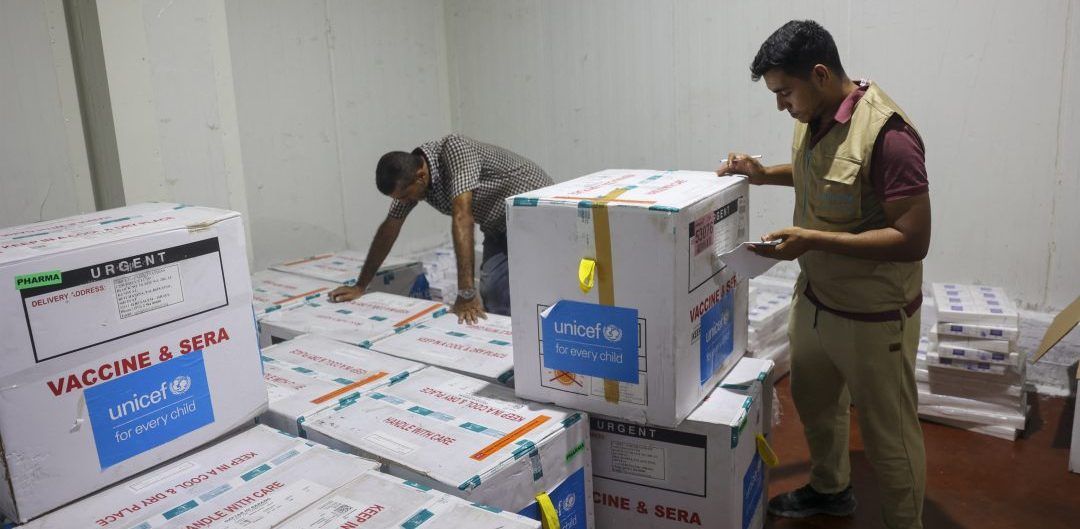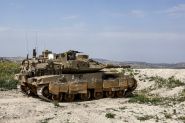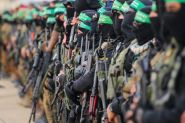- Home
- Middle East
- Gaza Humanitarian Operations Halted, Polio Outbreak Increasing

©(Photo by Eyad BABA / AFP)
The United Nations said Monday it had been forced to halt its humanitarian operations in Gaza due to a new Israeli evacuation order for the Deir al-Balah area, a senior UN official said.
"We are not operating today. As of this morning, we're not operating in Gaza," the official said, adding that since the start of the war the UN has sometimes had to "delay or take a pause."
"This is not a decision to cease operations, but practically, we cannot continue operating," the official said.
The UN had relocated most of its personnel to Deir al-Balah following a Rafah evacuation order several months ago, the official said.
The Israeli military had told people Sunday to "evacuate immediately."
"We need to find solutions," the UN official said. "And if it means that we need to anchor down for 24-48 hours and reset, we'll do that. But we're not leaving.
"Right now the challenge is to find a place where we can reset and effectively operate."
Polio Outbreak
Israeli military attacks on healthcare and water infrastructure and supplies, along with ongoing aid obstruction are contributing to a potentially catastrophic polio outbreak in Gaza, according to Human Rights Watch.
Polio, which is entirely preventable and spreads fast, particularly among children under 5, may cause disabilities, including paralysis, and can lead to death among unvaccinated children.
The Palestinian Ministry of Health confirmed the first case of polio in an unvaccinated 10-month old child in Gaza, on August 16, 2024.
"If the Israeli government continues to block urgent aid and destroy water and waste management infrastructure, it will facilitate the spread of a disease that has been nearly eradicated globally," said Julia Bleckner, senior health and human rights researcher at Human Rights Watch.
"Israel’s partners should press the government to lift the blockade immediately and ensure unfettered humanitarian access in Gaza to enable the timely distribution of vaccines to contain the unfolding polio outbreak."
WHO is planning to initiate two rounds of a polio vaccination campaign in Gaza, starting at the end of August. Humanitarian stakeholders are raising the alarm that it will be impossible to reach the more than 640,000 children who need polio vaccines if Israel continues its ongoing bombardments on civilians and civilian infrastructure and obstruction of humanitarian access.
"Children in Gaza are already suffering from starvation and rampant infectious disease as a result of Israel’s blockade and attacks on civilian infrastructure and are now facing an unprecedented polio outbreak without vaccines to protect them," Bleckner said. "Israel’s allies should unequivocally press for an end to the siege of Gaza."
Negotiations Ongoing
Egypt has said it will not accept the continued presence of Israeli forces along its border with the Gaza Strip, state-linked media reported on Monday.
Cairo, a key mediator in efforts to secure a ceasefire between Israel and Hamas in Gaza, "reiterated to all parties that it will not accept any Israeli presence" along the strategic Philadelphi Corridor, state-linked Al-Qahera News said, citing a high-level source.
A key sticking point in the ceasefire talks have been calls for Israel to withdraw its forces from the border area, including the Rafah crossing, the only one from the Palestinian territory that was not directly controlled by Israel.
Israeli forces seized the Palestinian side of the Rafah crossing in early May, a move that has cut off a crucial aid route and drawn repeated condemnation from Egypt and other countries.
"Egypt is managing the mediation" between Israel and Palestinian militant group Hamas "in accordance with its national security", the source told Al-Qahera News, which is linked to Egypt's state intelligence service.
The negotiations, also mediated by Qatar and the United States, have yielded little hope for a ceasefire, though Washington said Friday that some progress had been made.
Hamas said Sunday the group's delegation had met with Egyptian and Qatari mediators before leaving Cairo, where Israeli negotiators were also expected.
"We are not operating today. As of this morning, we're not operating in Gaza," the official said, adding that since the start of the war the UN has sometimes had to "delay or take a pause."
"This is not a decision to cease operations, but practically, we cannot continue operating," the official said.
The UN had relocated most of its personnel to Deir al-Balah following a Rafah evacuation order several months ago, the official said.
The Israeli military had told people Sunday to "evacuate immediately."
"We need to find solutions," the UN official said. "And if it means that we need to anchor down for 24-48 hours and reset, we'll do that. But we're not leaving.
"Right now the challenge is to find a place where we can reset and effectively operate."
Polio Outbreak
Israeli military attacks on healthcare and water infrastructure and supplies, along with ongoing aid obstruction are contributing to a potentially catastrophic polio outbreak in Gaza, according to Human Rights Watch.
Polio, which is entirely preventable and spreads fast, particularly among children under 5, may cause disabilities, including paralysis, and can lead to death among unvaccinated children.
The Palestinian Ministry of Health confirmed the first case of polio in an unvaccinated 10-month old child in Gaza, on August 16, 2024.
"If the Israeli government continues to block urgent aid and destroy water and waste management infrastructure, it will facilitate the spread of a disease that has been nearly eradicated globally," said Julia Bleckner, senior health and human rights researcher at Human Rights Watch.
"Israel’s partners should press the government to lift the blockade immediately and ensure unfettered humanitarian access in Gaza to enable the timely distribution of vaccines to contain the unfolding polio outbreak."
WHO is planning to initiate two rounds of a polio vaccination campaign in Gaza, starting at the end of August. Humanitarian stakeholders are raising the alarm that it will be impossible to reach the more than 640,000 children who need polio vaccines if Israel continues its ongoing bombardments on civilians and civilian infrastructure and obstruction of humanitarian access.
"Children in Gaza are already suffering from starvation and rampant infectious disease as a result of Israel’s blockade and attacks on civilian infrastructure and are now facing an unprecedented polio outbreak without vaccines to protect them," Bleckner said. "Israel’s allies should unequivocally press for an end to the siege of Gaza."
Negotiations Ongoing
Egypt has said it will not accept the continued presence of Israeli forces along its border with the Gaza Strip, state-linked media reported on Monday.
Cairo, a key mediator in efforts to secure a ceasefire between Israel and Hamas in Gaza, "reiterated to all parties that it will not accept any Israeli presence" along the strategic Philadelphi Corridor, state-linked Al-Qahera News said, citing a high-level source.
A key sticking point in the ceasefire talks have been calls for Israel to withdraw its forces from the border area, including the Rafah crossing, the only one from the Palestinian territory that was not directly controlled by Israel.
Israeli forces seized the Palestinian side of the Rafah crossing in early May, a move that has cut off a crucial aid route and drawn repeated condemnation from Egypt and other countries.
"Egypt is managing the mediation" between Israel and Palestinian militant group Hamas "in accordance with its national security", the source told Al-Qahera News, which is linked to Egypt's state intelligence service.
The negotiations, also mediated by Qatar and the United States, have yielded little hope for a ceasefire, though Washington said Friday that some progress had been made.
Hamas said Sunday the group's delegation had met with Egyptian and Qatari mediators before leaving Cairo, where Israeli negotiators were also expected.
Read more



Comments